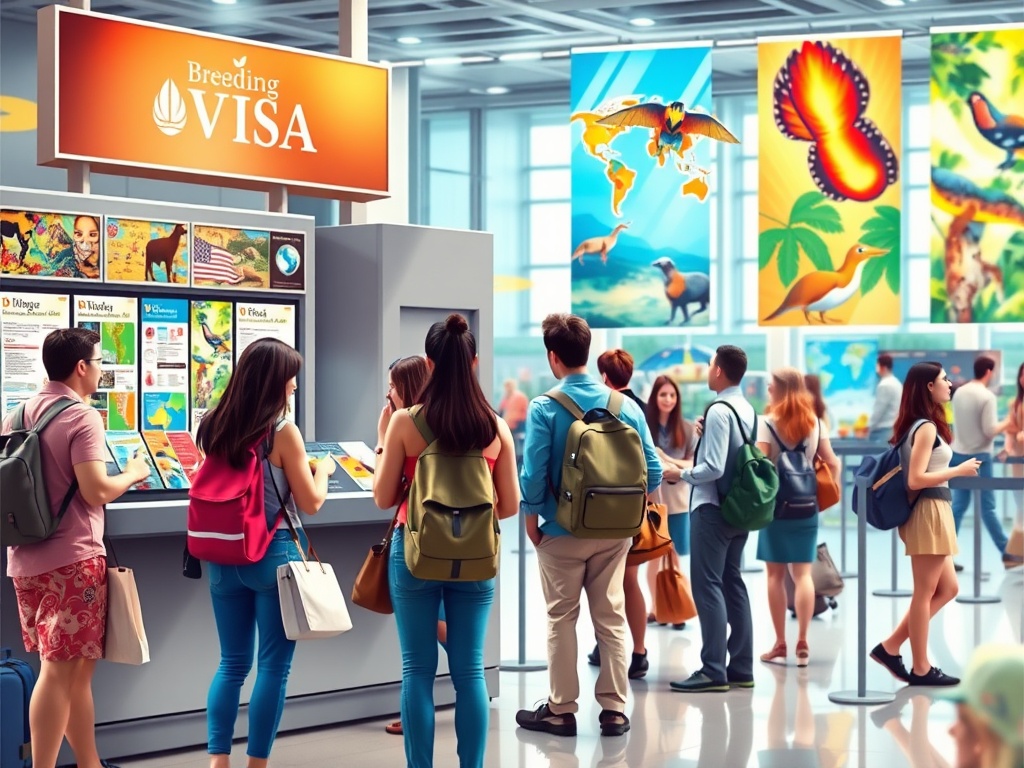Unlocking the Mysteries: What is a Breeding Visa?
Win a Free Trip to Japan!
Experience cherry blossoms and ancient temples

For travel and tourism enthusiasts eager to explore the world of animal breeding, understanding the concept of a ‘Breeding Visa’ is essential. This unique visa type is designed for individuals who wish to engage in breeding activities, often involving exotic or high-demand animals, across international borders. It opens up a realm of possibilities for animal lovers and professionals alike, offering a legal pathway to participate in breeding programs that span different countries.
A Breeding Visa serves a distinct purpose in the realm of international animal breeding. It allows breeders to legally transport animals across borders for breeding purposes, ensuring compliance with the host country’s regulations. This visa not only facilitates the exchange of genetic resources but also plays a crucial role in the conservation of species and the enhancement of breeding programs worldwide.
Key Benefits of a Breeding Visa:
- Facilitated Exchange: Enables the legal movement of breeding animals between countries.
- Conservation Efforts: Supports global conservation initiatives by aiding in the genetic diversity of species.
- Economic Opportunities: Opens up new markets and collaborations for breeders and animal enthusiasts.
Acquiring a Breeding Visa requires careful navigation of the application process. While it may vary depending on the destination country, there are common elements that applicants should prepare for. Thorough documentation and adherence to specific regulations are crucial to ensure a successful application.
| Requirement | Description |
|---|---|
| Legal Documentation | Proof of ownership and health certifications for the animals involved. |
| Visa Application Forms | Completed forms specific to the breeding activities and destination country. |
| Breeding Agreement | A formal contract between the parties involved, outlining the breeding objectives. |
| Compliance with Regulations | Adherence to local and international laws regarding animal transport and breeding. |
Essential Paperwork: Navigating the Breeding Visa Application Process
Embarking on the journey to acquire a Breeding Visa involves a meticulous process that ensures both the ethical treatment of animals and compliance with international standards. For travel and tourism enthusiasts passionate about animal breeding, understanding the paperwork involved is a pivotal step. This guide will help you navigate through the necessary documentation to secure a Breeding Visa efficiently.
Before diving into the application process, it’s crucial to prepare the core documents that form the backbone of your application. These documents not only validate your intent but also demonstrate your commitment to responsible breeding practices. Here’s a breakdown of the essential paperwork you need to assemble:
- Animal Ownership Proof: Ensure you have the official documentation or certificates proving ownership of the animals intended for breeding.
- Health Certifications: Acquire up-to-date health certificates for all animals involved, issued by a certified veterinarian, to ensure they meet the health standards of the destination country.
- Formal Breeding Agreement: Draft a comprehensive agreement that outlines the breeding objectives, responsibilities of each party, and expected outcomes.
The application forms specific to the Breeding Visa are designed to capture detailed information about your breeding activities and intentions. Each country may have its own set of forms, but they generally encompass similar sections. Paying close attention to these forms ensures that your application is processed smoothly and without unnecessary delays.
Key Sections of the Application Form:
- Personal Information: Provide accurate personal details, including your contact information and prior experience in breeding activities.
- Purpose of Visit: Clearly articulate the breeding objectives, the species involved, and the anticipated duration of your stay.
- Compliance Statements: Affirm your adherence to both local and international breeding laws, ensuring that you understand and will comply with all regulations.
Completing these forms with precision and honesty is paramount, as even minor errors can lead to delays or rejections. Therefore, double-checking each entry before submission is highly recommended.
Beyond Borders: Understanding International Breeding Regulations
For travel and tourism enthusiasts captivated by the allure of animal breeding across the globe, venturing into the realm of international breeding regulations is both a fascinating and essential journey. As you embark on this captivating exploration, understanding the intricate web of laws and agreements that govern animal movement and breeding across countries becomes pivotal. These regulations not only ensure the ethical treatment of animals but also safeguard ecological balance and species conservation efforts.
In the world of international breeding, compliance with global standards is non-negotiable. Each country has its unique set of laws designed to protect native fauna and ensure that breeding activities do not disrupt local ecosystems. Understanding these laws is crucial for anyone looking to engage in breeding activities beyond their national borders. Many countries require detailed documentation that outlines the purpose and expected impact of the breeding activities, ensuring transparency and accountability. This not only facilitates legal animal transport but also promotes ethical breeding practices that align with conservation goals.
International breeding regulations also open doors to cross-cultural collaborations that can be both financially rewarding and culturally enriching. By partnering with breeders from different regions, you gain access to diverse genetic pools, enhancing breeding programs’ quality and sustainability. However, navigating these partnerships requires a deep understanding of each partner country’s regulatory landscape, as well as the ability to negotiate mutually beneficial agreements. These collaborations often demand a fine balance between innovation and adherence to established guidelines, fostering a dynamic exchange of knowledge and resources.
For those passionate about animal breeding, delving into international regulations can transform a simple endeavor into a global adventure. By mastering these rules and forming strategic alliances, you not only contribute to the conservation and ethical treatment of animals but also enrich your own breeding practices with global insights.
The Insider’s Guide: Tips for a Smooth Breeding Visa Approval
Embarking on a journey to secure a Breeding Visa can be a thrilling adventure for those passionate about animal breeding. Navigating the complex web of regulations and paperwork might seem daunting at first, but with the right insights and strategies, you can sail smoothly through the approval process. For travel and tourism enthusiasts keen on exploring breeding opportunities across borders, understanding the nuances of a Breeding Visa is crucial to ensuring a hassle-free experience.
One of the key aspects to consider when applying for a Breeding Visa is the importance of understanding the ecological and regulatory landscape of the host country. Each nation has its own set of guidelines and requirements when it comes to animal breeding, often dictated by the need to protect local wildlife and biodiversity. Familiarize yourself with these regulations to ensure your intentions align with the host country’s conservation efforts.
Researching the specific laws and policies related to animal transport and breeding within the destination country can provide you with a solid foundation. This knowledge not only aids in the application process but also demonstrates your commitment to adhering to and respecting the host nation’s ecological balance. By doing so, you not only enhance your chances of visa approval but also contribute positively to the global breeding community.
To stand out in the Breeding Visa application process, it is essential to build a comprehensive and compelling application portfolio. This includes gathering all necessary documentation, such as health certificates, ownership proofs, and breeding agreements, which serve as evidence of your preparedness and dedication to ethical breeding practices. Ensure that all documents are up-to-date and accurately reflect your intentions and capabilities as a breeder.
Moreover, crafting a well-structured application that clearly outlines your breeding objectives, the species involved, and the expected outcomes can significantly boost your chances of approval. Highlight any prior experiences or collaborations that underscore your expertise, and be sure to address how your breeding activities will align with the host country’s regulations and conservation goals. Attention to detail and a proactive approach in showcasing your qualifications can set your application apart from the rest.
Cultural Exchange: How Breeding Visas Foster Global Connections
For those immersed in the vibrant world of animal breeding, acquiring a Breeding Visa isn’t just about paperwork and regulations—it’s a gateway to a fascinating cultural exchange that transcends borders. This unique visa type not only facilitates the movement of animals but also serves as a bridge connecting diverse communities and fostering global understanding. By engaging in breeding activities internationally, travel enthusiasts have the opportunity to immerse themselves in different cultures, gaining insights and experiences that are as enriching as the breeding programs themselves.
One of the most profound benefits of a Breeding Visa is the cultural tapestry it weaves between nations. Breeders traveling across countries bring with them not just expertise but also a piece of their own culture, promoting a dynamic exchange of ideas and traditions. As you engage with breeders from various regions, you gain a deeper appreciation for different cultural approaches to animal care and breeding. This exchange often leads to lifelong friendships and partnerships, enriching both personal and professional lives. Moreover, as you learn about local customs and practices, you become an ambassador for your own culture, fostering mutual respect and understanding.
In addition to cultural enrichment, Breeding Visas play a crucial role in global conservation efforts. By facilitating international breeding collaborations, these visas help preserve endangered species and maintain genetic diversity across the globe. Collaborating with breeders in different countries allows for the sharing of valuable insights and techniques, leading to more effective conservation strategies. These international partnerships not only enhance the quality of breeding programs but also contribute to the broader mission of wildlife conservation, ensuring a sustainable future for diverse species worldwide.
Common Pitfalls: Avoiding Errors in Your Breeding Visa Journey
Venturing into the world of international animal breeding is an adventure filled with opportunities and challenges. While the allure of exploring new breeding grounds is compelling, the process of securing a Breeding Visa can be fraught with potential pitfalls. Being aware of these common mistakes is crucial for travel and tourism enthusiasts who are eager to avoid setbacks and ensure a smooth application journey.
One of the most frequent errors applicants make is neglecting essential paperwork. Each document serves a specific purpose and any missing piece can lead to significant delays or even visa denial. Ensure you have all necessary paperwork, such as animal health certificates and ownership proofs, meticulously organized and up-to-date.
Tip: Create a checklist to track each document’s status, ensuring nothing is left to chance. This proactive approach not only minimizes errors but also demonstrates your thorough preparation to the visa authorities.
When engaging in cross-border breeding activities, understanding the host country’s regulations is paramount. Each nation has its own set of laws to protect its biodiversity, and failing to comply can lead to severe repercussions.
Research the ecological and legal requirements thoroughly and tailor your application to reflect compliance. Demonstrating your knowledge and respect for these rules will not only smooth your visa process but also highlight your commitment to ethical breeding practices.
Precision is your best ally when completing visa application forms. Even minor errors, such as incorrect personal information or misreported breeding objectives, can trigger delays or rejections.
- Double-check all entries for accuracy before submission.
- Seek guidance from experts or consult official resources to ensure clarity and correctness.
Remember, a carefully reviewed application not only reflects your professionalism but also increases your chances of a successful outcome.
Future Trends: The Evolution of Breeding Visas in a Globalized World
In a world that is becoming increasingly interconnected, the concept of Breeding Visas continues to evolve, offering new opportunities for travel and tourism enthusiasts passionate about animal breeding. As globalization reshapes how we move, collaborate, and innovate across borders, Breeding Visas are adapting to meet the demands of a dynamic and diverse world. This evolution not only reflects changes in international policies and conservation efforts but also heralds exciting prospects for those involved in the global breeding community.
The future of Breeding Visas is being redefined by the integration of technology into the visa application process. With advancements in digital platforms, applicants can expect more streamlined and efficient processes. The use of blockchain technology for secure documentation and artificial intelligence to assist in reviewing applications is becoming more prevalent. These innovations promise to reduce processing times and minimize errors, making it easier for enthusiasts to embark on their breeding journeys. Furthermore, virtual platforms may soon enable applicants to interact with host countries’ regulatory bodies in real-time, ensuring clarity and compliance with local laws.
As the importance of biodiversity conservation gains international traction, Breeding Visas are likely to adapt in response to these global priorities. Future regulations are expected to place greater emphasis on ecological sustainability and the preservation of endangered species. This shift will encourage more cross-border collaborations and knowledge exchanges aimed at fostering genetic diversity and species conservation. For travel and tourism enthusiasts, this presents an opportunity not only to participate in breeding programs but also to contribute meaningfully to worldwide ecological efforts. The evolving framework of Breeding Visas will likely reflect these emerging priorities, ensuring that breeding activities are both ethical and aligned with conservation goals.


